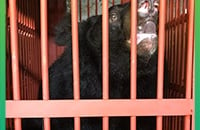Why it takes more than two weeks to end the Yulin festival
22 June 2016
Early reports say pressure continues to shrink the Yulin festival - but to end it we need to end all dog meat eating in China, writes Animals Asia founder Jill Robinson.
For a fortnight each year dog meat eating in China makes headlines. It’s debated on social media, celebrities become involved, we’re invited onto TV to discuss the issues, then sadly the coverage and much of the interest ends.
Meanwhile evidence suggests that 10 million dogs are still being eaten in China.
Last week I sat with 150 representatives from Chinese government and Chinese animal NGOs. Between them they covered over 35 of China’s vast cities and discussed new and ongoing projects of collaboration surrounding dog management.
Even a few years ago such meetings would have been unthinkable, but today these incredible people are taking vital messages, powered by their youth and their passion, to their own corners of this country.
China’s Xinhuanet website reported today that the Yulin festival was “cooling down” - as part of the report it quoted a dog meat trader saying:
“My son, a high school student, used to eat dog meat with us, but he decided to never eat it again last year under pressure from his friends.”
This is what is happening in China. This is what is powering positive change. This is what motivates the 9m people in China who voted for draft legislation to make dog meat eating illegal.
This is what these incredible Chinese animal lovers that we count as friends are doing, and we are proud to be a part of their work.
Many of the groups we collaborate with - 71 in all - shared a statement that they would no longer take part in or condone the buying of animals from meat traders during the Yulin festival.
This was, as they saw it, a black and illegal market responsible for raising trader profits that would ultimately be spent on more dogs to slaughter. Slaughterhouses empty - but not shut down - and filling up again with hundreds more dogs who can’t be helped.
Local shelters are bursting at the seams with rescued dogs confiscated year round from trucks transporting them across the country - and they all need help.
It’s telling that the dog meat traders are reporting “a bad year” because they didn’t sell many dogs. They aren’t saying they didn’t have enough dogs - sadly there are always more dogs that can be snatched.
The group statement reminded people that Yulin might be in the spotlight for a short while, but the welfare of dogs across China demands a much longer commitment.
Within their letter - this paragraph on what they must do instead to end all dog meat eating is very telling:
“We need to urge the government to strengthen law enforcement, we need to do more public education work, make more legal challenges, increase correspondence with government, seek more celebrity support, seek more international support and more media coverage. These are all pragmatic methods - not high profile buying of dogs, and not fundraising without transparent accounts where neither donations nor dogs can be tracked.”
Ending dog meat eating in China is not easy. We can each of us make a difference but we won’t make real change on our own. There are no simple answers. Nothing can replace consistent hard work and dedication - and a refusal to give up.
But what is key, and where we are seeing success - is that the debate is growing, investigations are exposing the truth, and the appetite for dog meat is diminishing.
Increasingly in China, people are recognising dogs as our friends and helpers. Hospitals are embracing visits by dogs, schools are welcoming canine “teachers” who offer unconditional love to the students, and communities are beginning to recognise the remarkable bond between dogs and humankind. Attitudes are changing and the stigma attached to eating dog is growing. Year in, year out, this work goes on.
Together we can end this.
Further reading:
Five ways to end the Yulin dog meat eating festival
How theft of a blind man’s dog is helping China see its dog theft problem
Our Cat and Dog Welfare Team Programme
BACK











 Freedom after two decades: Moon bears Nang and Mua rescued
Freedom after two decades: Moon bears Nang and Mua rescued
 With heavy hearts we say goodbye to our beloved Tulip
With heavy hearts we say goodbye to our beloved Tulip
 Three moon bears rescued from notorious bear bile farming hotspots in Vietnam
Three moon bears rescued from notorious bear bile farming hotspots in Vietnam
